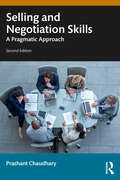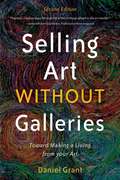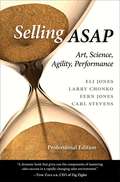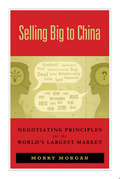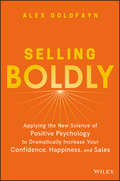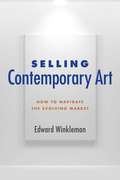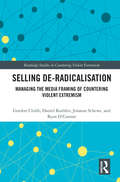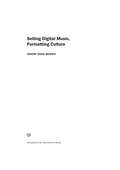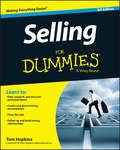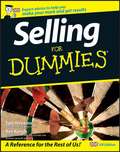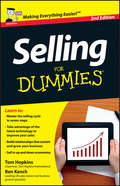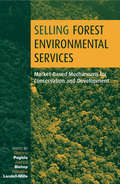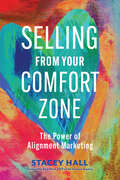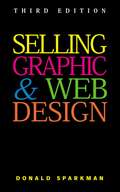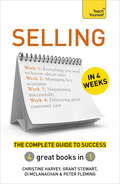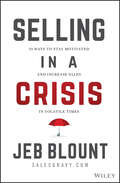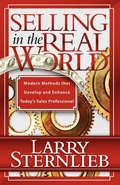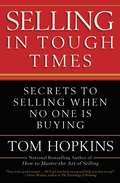- Table View
- List View
Selling and Negotiation Skills: A Pragmatic Approach
by Prashant ChaudharyThis book is a complete guide to learning the critical selling and negotiation skills to gain a competitive edge in a challenging business environment. The volume covers various negotiation approaches, strategies, tactics and styles that are adaptable and compatible with emerging business models and technologies. Businesses worldwide are adapting to changing consumer behaviour and focusing on more sustainable and future-ready selling and negotiation strategies. Richly illustrated with examples from diverse domains and real-life situations for an easy understanding of the subject, this book looks at strategies, tactics and styles for negotiation and the tools or technologies used for effectively selling; business cases and scenarios that illustrate the direct application of concepts, making the book practical, accessible and relevant and customer-centric selling and negotiation strategies, processes and approaches. A valuable companion for students, teachers, research scholars and professionals working in sales, business and management, this revised edition will also be of interest to those working in the areas of global business and trade, international affairs, marketing and economics.
Selling Art without Galleries: Toward Making a Living from Your Art
by Daniel Grant“Not simply a how-to book, Selling Art without Galleries is a hands-on guidebook to daily life in the complex and sometimes murky world of the art market.” —Sculpture Magazine The days in which artists must get their work into galleries in order to gain success and recognition are long over. With that in mind, Daniel Grant gives readers advice on the multitude of options artists now have for marketing their work as well as how to sell work in a host of nontraditional venues, such as online, through open studio events, and in hospitals, restaurants, and art fairs. In this updated and revised edition, Grant provides new chapters on such topics as: Publicity and social media Public art loan programs Meeting prospective buyers at museums “Handmade” and “Made in America” Artists’ estates and private foundations The benefits of donating artwork In addition, Grant includes tips on disaster preparedness, workspaces, housing and residencies, emergency funds, and legal assistance. For any artist looking to explore success outside of a gallery, Selling Art without Galleries is a comprehensive and invaluable guide.
Selling Art Without Galleries: Toward Making a Living from Your Art
by Daniel GrantThe first guide to selling art independently. This comprehensive resource shows artists how to make a living from their art-without relying on galleries. Through interviews with a range of successful artists, readers will learn how to write about their own work, how to arrange and curate exhibits, how to work in nonprofit arts spaces, how to determine when and if to advertised artwork for sale, and how to exhibit in non-art spaces. Artists will also find useful information for marketing their work, including photographing and framing, selling at art fairs, getting into juried shows, and selling over the Internet. Selling Art Without Galleries empowers artists everywhere to take control over their careers and find a market for their art. Easy-to-follow, in-depth advice on the marketing of art Follow-up to The Business of Being an Artist-35,000 copies sold! Exclusive information on "thinking outside the gallery" from other artists
Selling as a Systematic Process
by Michael Alter Amar V. BhideDescribes a systematic approach to selling. The author, a former IBM salesman, believes that selling requires progressing through a series of stages, which culminate in "getting the order." Describes several techniques useful in managing this progression.
Selling ASAP: Art, Science, Agility, Performance
by Eli Jones Larry Chonko Fern Jones Carl StevensSelling ASAP combines both timely and timeless components of selling to help professionals achieve their sales objectives in today's fast-paced business world. As the authors demonstrate, rapidly changing customer expectations have led to a dramatic shift in the business of selling. Customers no longer want product experts -- they want trusted advisors. This invaluable guide stresses the importance of viewing a sale not as a one-time encounter but as an opportunity to build a long-lasting, mutually beneficial relationship. Utilizing sound academic research and solid business practices, the authors provide strategies for better anticipating client needs and prescribing solutions that build value over time. The professional edition of Selling ASAP includes numerous practical tips, such as how to behave during a sales call, what language to use or avoid, and how to complete a transaction and begin a profitable business relationship. In addition to covering the fundamentals, Selling ASAP offers innovative sales techniques -- backed by extensive research -- for the modern salesperson.
Selling Beauty: Cosmetics, Commerce, and French Society, 1750–1830 (The Johns Hopkins University Studies in Historical and Political Science)
by Morag MartinAn “enjoyable” history of the French cosmetic industry and the evolution of beauty standards and commercial culture during a revolutionary era (European History Quarterly).As the French citizenry rebelled against the excesses of the aristocracy, there was a parallel shift in consumer beauty practices. Powdered wigs, alabaster white skin, and rouged cheeks disappeared in favor of a more natural and simple style.Selling Beauty challenges expectations about past fashions and offers a unique look into consumer culture and business practices. Morag Martin introduces readers to the social and economic world of cosmetic production and consumption, recounts criticisms against the use of cosmetics from a variety of voices, and examines how producers and retailers responded to quickly evolving fashions.Martin shows that the survival of the industry depended on its ability to find customers among the emerging working and middle classes. But the newfound popularity of cosmetics raised serious questions. Critics—from radical philosophes to medical professionals—complained that the use of cosmetics was a threat to social morals and questioned the healthfulness of products that contained arsenic, mercury, and lead. Cosmetic producers embraced these withering criticisms, though, skillfully addressing these concerns in their marketing campaigns, reassuring consumers of the moral and physical safety of their products.Rather than disappearing along with the Old Regime, the commerce of cosmetics, reimagined and redefined, flourished in the early nineteenth century—as political ideals and Enlightenment philosophies radically altered popular sentiment.
Selling Big to China
by Morry MorganThis book is a complete sales and negotiating guide for mainland China and includes practical and measurable techniques that have been tested and proven to work with Fortune 500 companies operating in the 'Middle Kingdom'. It is divided into four main areas: The Knowledge The Sales Call The Negotiation The Maintenance The book is the result of my 8 years of training in sales and negotiation skills across mainland China, as well as running a multi-city, multicultural company in the 'World's Most Stressful Country' (according to Newsweek). The book includes a collection of anecdotes from this experience, as well as case studies developed by working closely with leading companies in China. Some of these companies include Rockwell Automation, Microsoft, Thomson, SAP, and NBC. Sales and negotiating is not easy, particularly when done in a country with completely new values and rules of engagement. The purpose of this book is to lay the rules out clearly, and provide the reader with an easy to understand strategy to doing business in mainland China.
Selling Biovail Short
by Aldo Sesia Christopher J. Lombardi Malcolm P. BakerHedge fund SAC Capital and analysts from Gradient Analytics and Banc of America face charges of stock price manipulation from Biovail, a Canadian pharmaceutical company. Gradient and BofA produced negative reports on Biovail's earnings quality. At the same time, SAC built a large short position in the stock. The defendants must consider specific and general strategic responses to these allegations.
Selling Boldly: Applying the New Science of Positive Psychology to Dramatically Increase Your Confidence, Happiness, and Sales
by Alex GoldfaynIF YOU’RE IN SALES, FEAR HAS COST YOU MILLIONS OF DOLLARS, AND THIS BOOK IS FOR YOU. Fear is the reason most salespeople don’t like to pick up the phone (salespeople average just four hours per week on the phone, and our job is to talk to humans!). Fear is the reason we don’t ask for the business more, even though our customers want to buy from us. Fear is the reason we don’t offer our customers additional products and services, even though they would love to buy more from us. This book deals with that fear. You will learn exactly how to overcome this destructive fear in sales, and replace it with confidence, optimism, gratitude, joy, and proactive sales work. These are the powerful principles in the new field of positive psychology which are transforming how we work and succeed. Selling Boldly is the first book that leverages positive psychology to help you sell more. You’ll also learn a series of fast, simple sales-growth techniques—like how to add on to existing orders; and how to close 20% more quotes and proposals instantly; and how to properly ask for and receive referrals—that will grow your sales…dramatically and quickly. Alex Goldfayn’s clients grow their sales by 10-20% annually, every year, as long as they apply his simple approaches. IF YOU’RE IN SALES, FEAR HAS COST YOU MILLIONS OF DOLLARS, AND THIS BOOK IS FOR YOU. Fear is the reason most salespeople don’t like to pick up the phone (salespeople average just four hours per week on the phone, and our job is to talk to humans!). Fear is the reason we don’t ask for the business more, even though our customers want to buy from us. Fear is the reason we don’t offer our customers additional products and services, even though they would love to
Selling Contemporary Art: How to Navigate the Evolving Market
by Edward WinklemanA sophisticated examination of today’s contemporary art market from an art dealer’s point of view, this new book focuses on recent changes in the quickly evolving market. With an emphasis on how the market responded to the global recession that began in 2008, gallery owner Edward Winkleman moves from an examination of the factors beyond the individual dealer’s command to those that the dealer can control. Sections cover: The rise of the art fair The rise of the mega gallery New online competition Models of post-brick-and-mortar art dealing Art dealers as art fair organizers Collaboration in a new era Coverage is also given to the specifics of contracts contemporary art dealers may need, including an examination of a variety of contracts for representation, consignment, and new forms of contemporary art. Exhibiting a wide range of interviews with international experts including dealers, collectors, art-fair directors, journalists, and online art entrepreneurs, Selling Contemporary Art is a must-read for gallery owners, dealers, and artists affected by the rapid innovations in the art-dealing industry.
Selling Continuously: Paid to Think
by David GoldsmithYou sell all day every day ... to your board members, front-line staff, vendors, lenders, public, customers, colleagues, significant others, and more in order to realize the types of successes your organization depends on you to achieve. Yet, selling for the leader is much different than it is for the salesperson of goods and services, and that means you need to add a different set of skills and tools, such as those provided here, to gain buy-in and cooperation from others and to reach your desired outcomes.
Selling De-Radicalisation: Managing the Media Framing of Countering Violent Extremism (Routledge Studies in Countering Violent Extremism)
by Gordon Clubb Daniel Koehler Jonatan Schewe Ryan O'ConnorThis book examines how de-radicalisation programmes have been portrayed in the media and details the role of public relations (PR) strategies employed by such programmes and Countering Violent Extremism (CVE) to create positive coverage of their work. CVE and de-radicalisation programmes have seen a significant rise in recent years and are now cornerstones of many countries’ counterterrorism strategies. Despite the increased importance of these tools to counter violent radicalisation leading to terrorism, they remain controversial and sometimes receive fierce public criticism and opposition. This work looks at how CVE and de-radicalisation programs are able to influence a country’s discourse on de-radicalisation, and how far governmental programs differ from non-governmental initiatives in terms of their PR strategies. The book also provides a theoretical basis of how the discourse on CVE is constructed in the media. As major case studies, this book examines the United Kingdom, Germany and Nigeria. For these countries, the authors have gathered and assessed roughly 3,000 newspaper articles on de-radicalisation programmes over a decade to provide an empirical base. This book will be of much interest to students of countering violent extremism, de-radicalisation, and terrorism studies.
Selling Digital Music, Formatting Culture
by Jeremy Wade MorrisSelling Digital Music, Formatting Culture documents the transition of recorded music on CDs to music as digital files on computers. More than two decades after the first digital music files began circulating in online archives and playing through new software media players, we have yet to fully internalize the cultural and aesthetic consequences of these shifts. Tracing the emergence of what Jeremy Wade Morris calls the "digital music commodity," Selling Digital Music, Formatting Culture considers how a conflicted assemblage of technologies, users, and industries helped reformat popular music's meanings and uses. Through case studies of five key technologies--Winamp, metadata, Napster, iTunes, and cloud computing--this book explores how music listeners gradually came to understand computers and digital files as suitable replacements for their stereos and CD. Morris connects industrial production, popular culture, technology, and commerce in a narrative involving the aesthetics of music and computers, and the labor of producers and everyday users, as well as the value that listeners make and take from digital objects and cultural goods. Above all, Selling Digital Music, Formatting Culture is a sounding out of music's encounters with the interfaces, metadata, and algorithms of digital culture and of why the shifting form of the music commodity matters for the music and other media we love.
Selling For Dummies
by HopkinsYour hands-on guide to the most up-to-date selling strategies and techniquesAre you looking to enter the world of sales, or are you already a salesperson who's looking for new tips and tactics to expand your business? No matter your level of skill, this guide will help you lay a foundation for sales success, with the latest information on how to research your prospects, break down the steps of the sales process, follow up with happy customers, and much more.The wonderful world of selling -- discover what selling is (and isn't) and find out how mastering selling skills can benefit all areas of your lifeStand out from the crowd -- find out how knowing your clients sets you apart from average persuaders and helps you hear more yesesScale the steps to success -- discover the seven steps of the selling cycle to score appointments, make a good impression, give winning presentations, address client concerns, close sales,and moreIf you build it, they will come -- take your career to the next level with valuable tips on how to stay in touch with clients, harness the power of the Internet to make more sales, manage your time wisely, and partner with othersOpen the book and find:Tips for approaching selling with passion and a positive attitudeThe latest prospecting and qualification strategiesTop techniques for sales presentationsHelpful hints on handling client concernsGuidance on getting referralsThe scoop on using the latest technology to your advantageInformation on establishing goals and planning your time efficientlyAdvice on staying upbeat when you don't succeedLearn to:Be truly well-prepared for every selling situation you encounter or createClose sales in seven steps or lessTake advantage of the latest technology during the selling processSet and achieve sales goals to grow your business
Selling For Dummies
by Hopkins Ben KenchBeing a successful salesperson isn't only useful in a traditional sales role. Whether you want to sell a new product to a business, an idea to an investor, or yourself in an interview, this book provides you with all the tips and techniques you need to stand out from the crowd. This straight-talking guide helps you develop the sales, communication, and negotiating skills you need to deliver successful presentations, win and retain customers, maintain your confidence, and get the results you want.
Selling For Dummies
by Ben KenchGet a handle on the most up–to–date selling strategies and techniques that will help you grow your business. Are you looking to enter the world of sales, or are you looking for new tips and tactics to expand your business? Selling For Dummies gives you the latest information on how to research your prospects, master the steps of the sales process, follow up with happy customers, and much more. This straight–talking guide helps you develop the sales, communication, and negotiating skills you need to deliver successful presentations, win and retain customers, and get the results you want. Discover what selling is - and isn′t! Find out how knowing your clients sets you apart from the rest and helps you get to ‘yes’ Use the seven steps of the selling cycle to score appointments, make a good impression, give winning presentations, address client concerns, close sales and more Get valuable tips on how to follow up and build a long-term relationship with clients Learn how you can sell well in any economy
Selling Forest Environmental Services: Market-Based Mechanisms for Conservation and Development
by Stefano Pagiola Joshua Bishop Natasha Landell-MillsThe risks posed by forest destruction throughout the world are highly significant for all. Not only are forests a critical source of timber and non-timber forest products, but they provide environmental services that are the basis of life on Earth. However, only rarely do beneficiaries pay for the goods and services they experience, and there are severe consequences as a result for the poor and for the forests themselves. It has proved difficult to translate the theory of market-based approaches into practice. Based on extensive research and case studies of biodiversity conservation, watershed protected and carbon sequestration, this book demonstrates how payment systems can be established in practice, their effectiveness and their implications for the poor.
Selling Free Enterprise: The Business Assault on Labor and Liberalism, 1945-60
by Elizabeth A. Fones-WolfExplores the following topic: PART 1 The Postwar Employer Counteroffensive PART 2 In the Factory PART 3 In the Community PART 4 Institutions PART 5 After the Merger
Selling from Your Comfort Zone: The Power of Alignment Marketing
by Stacey HallYou don't have to betray yourself or your values to close stellar sales. This book introduces a simple formula for a personalized approach to building connections through alignment and problem-solving.So many salespeople believe that they have to push themselves out of their comfort zones and compromise their values to sell products. But, as Stacey Hall shows, the comfort zone can actually be a power zone that leads to sales, satisfaction, and success. Selling from Your Comfort Zone shifts away from "pushy" and "spammy" sales tactics and instead shows how you can bring meaning to your role as a salesperson. Hall teaches how to remain in alignment with your calling, with yourself, with what you are selling, with your prospects, and with what you are saying to your prospects. By being aligned with your core values and personality traits, you will have more confidence, energy, and courage to achieve your goals, which greatly increases the chances of success. Studies reveal that while men generally rely on improving and driving outcomes to close sales, women tend to emphasize building connections, shaping solutions, and collaborating. Hall's Alignment Marketing formula combines both skillsets in an easy-to-follow process for gently expanding your comfort zone to the edge of its safe boundaries. By adopting this approach, you can stay flexible and resilient in the face of problems and objections that all salespeople encounter along the way.
Selling Graphic and Web Design
by Donald SparkmanExpert guidance on selling graphic design, in print and online. Attract today's savvy design clients! A veteran designer who turned his small business into a multimillion-dollar new-media company shares his strategies for success in this new edition of the acclaimed Selling Graphic and Web Design. Donald Sparkman's approach blurs the lines between graphic design, web design, and marketing by building strategic partnerships and thinking outside the box. No-nonsense advice for writing proposals and offering the right design solutions, plus information on providing services that fit a client's needs and budget, have made this book indispensable. Now, in this revised and expanded version, leading Internet designers share strategies on effective marketing for the web, including pricing, billing, portfolios, ethics, brand design, web content management, brand law, and much more. Trusted advice and the latest strategies combine to make Selling Graphic and Web Design a great one-stop resource for designers in every field. New edition of a classic Up-to-the-minute advice on selling to internet clients Get the top clients and keep them
Selling in 4 Weeks: The Complete Guide to Success: Teach Yourself
by Christine Harvey Grant Stewart Di MclanachanWhatever your degree of prior knowledge, this 28-day course will put you on the path to business success. It includes four tried-and-tested bestselling titles - Successful Selling in a Week; Key Account Management in a Week; Successful Customer Care in a Week; Successful Negotiation in a Week. Each day of the course is packed with proven and practical advice, and is rounded off by a quiz which helps you ensure you have understood the key areas.
Selling in a Crisis: 55 Ways to Stay Motivated and Increase Sales in Volatile Times (Jeb Blount)
by Jeb BlountFind the motivation and confidence to stay on top when everything hits the fan In volatile times, it is hard to sell. It seems like every company is on a spending freeze, cutting back, or pushing off making decisions. Buyers become scarce and the competition for the few that are still buying is fierce. People don&’t want to meet with you, objections are harsher, customers cancel orders and contracts on a whim and pressure you for price decreases. Yet, you are still under the same pressure to make your sales number. If you don't, your income will take a hit. Don&’t even mention the 401(k) that you are afraid to even look at with the markets in free fall. In this situation, it&’s natural to feel stressed out and feel demotivated. In Selling in a Crisis, the world&’s most sought-after sales trainer Jeb Blount delivers an essential blueprint for staying motivated, keeping your pipeline full, increasing sales, retaining your customers, and advancing your career in times of uncertainty and change. In his classic, no-nonsense style, Jeb gives you 55 easy to consume tips, techniques, and tactics that are time-tested and proven to help you stay on top when everything and everyone else is down. You&’ll also discover: The real secrets to selling more in a crisis The difference between rainmakers and rain barrels and how to find opportunity in adversity Why you must stop swimming naked and put your bathing suit on Why you don&’t get into buckets with crabs How to be a RIGHT NOW sales professional 7 Steps of Effective Prospecting Sequences and how to be professionally persistent How to adjust sales messaging to meet the moment The sales secrets of frogs, squirrels, and horses Sutton&’s Law and why you must go where the money is Why you need more than charm and a great personality to close sales in a crisis The five questions you must answer in the affirmative for every stakeholder How to handle buying commitment objections in a crisis How to protect your turf from competitors and your profits from price decreases Five ways to protect and advancing your career How to be bold and always trust your cape And so much more . . . Jon Kabat-Zinn once said, "You can't stop the waves, but you can learn to surf." This is exactly what you&’ll learn to do in this indispensable guide for sales professionals who are navigating the rough seas of volatility. With each chapter you will find the motivation, inspiration, and confidence catch to rise above the negativity, catch your wave, and take control of your life, career, mindset, and income.
Selling in Customer Service: Integrating and Coordinating Service and Selling
by Leon Cai"Service" in this book refers to the behaviors and actions of serving customers. "Selling" in this book refers to the behaviors and actions of selling products to customers. Hence, this book is completely different from other books on these subjects—Despite the fact that there are many books on service improvement and many related to selling skills worldwide, there are few books on how service and selling are integrated and coordinated. Primarily, it focuses on the interaction and transition between "the behavior of service" and "the behavior of selling" by sharing methods and skills of how those two are interrelated. This book provides many helpful guidelines and solutions for turning customers’ satisfaction with service into growth in sales. Through many refreshing ideas, the author helps you deeply understand the significance of integration of and conversion between service and selling and the harm of disconnection between service and selling. Many new ideas and viewpoints, which are different from other service books or sales books, are discussed, such as the contention that "over-service and over-selling should be prevented."Instead of: Giving highly complex and abstract definitions of "service" or "selling," this book redefines service and selling with "say YES to customers" and "Make customers say YES" respectively. Insisting that customers’ satisfaction with service will naturally lead to their long-term loyalty, this book emphasizes that customers' satisfaction with service has a shelf lifetime, which will soon fade over time. Taking the achievement of customer satisfaction as the final purpose of service, the author believes that "the end of service is not customer satisfaction, but to create new customer needs and achieve increased sales." Taking "meeting or exceeding customer expectations" as the golden rule, the author insists that "customer expectations need to be reduced first, then satisfied, and upgraded finally." Focusing on the development of customers’ buying needs like other books do, this book focuses oppositely on the research of "why customers have no buying needs."
Selling in the Real World: Modern Methods that Develop and Enhance Today's Sales Professional
by Larry SternliebAre you a seasoned salesperson in search of something to take you to the next level? A mid-range seller who could use pointers that really work? Or even someone newly considering sales as a career? If so, then Selling in the Real World is a book you simply must have, read, and put into practice. Filled with 'real world' examples, Selling in the Real World by Top Salesman Larry Sternlieb gives examples that work and provides direction that closes deals and makes sales. Selling in the Real World contains the same well-thought-out, complete, and effective sales program that has been well received and strongly recommended by the participants who attend Larry Sternlieb Seminars. if you only buy one book this year on How to Have a great and Successful Career in Sales, Selling in the Real World should be your hands-down first choice!
Selling in Tough Times: Secrets to Selling When No One Is Buying
by Tom HopkinsTough Times can be brought on by any number of factors: a down economy, Mother Nature, shifts in customers' needs, national tragedy--the list goes on and on. These types of changes can be extremely disruptive, even paralyzing, when we're not prepared for them. While many see no other option than to "sit tight" and "ride things out" when crisis strikes, true career professionals in selling understand that the only way to deal with adversity is to meet it head-on. That's why a positive attitude and a proactive approach to problem-solving are two of the most essential ingredients for success in selling--and why those who embrace them not only to survive but thrive, even in the most difficult of circumstances. Now, in his latest book, SELLING IN TOUGH TIMES, world-renowned selling expert Tom Hopkins puts his real-world , in-the-trenches experience to work and shares his plan to reverse the momentum of tough times--and even capitalize on them. With exercises to help you discover previously overlooked opportunities and eliminate waste, along with out-of-the-box methods for recruiting new customers and key tips on how to solidify your existing business, Hopkins gives you powerful ways to spur sales now and for years to come. Learn how to: * Mine your client list to generate new leads * Keep--and reward--your current customers so that they're loyal for life. * Reduce the sales resistance that plagues tough times with tactics that overcome consumers' fears. * Woo clients from your competition with 12 new strategies specially tailored for tough times. Cycles will come and go, but the principles of great selling and those who live by them stand firm. Find out how you can achieve your maximum selling potential, whatever the business climate, in SELLING IN TOUGH TIMES today.
